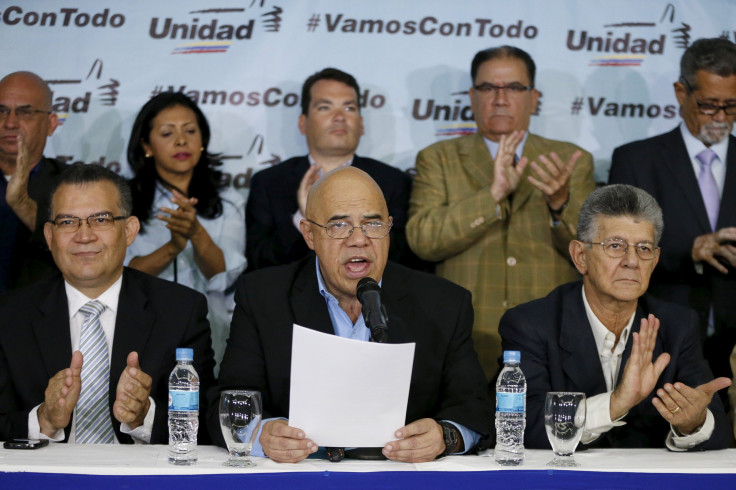
Venezuela’s Democratic Unity Roundtable (MUD) announced Tuesday that they have a three-tiered plan to oust President Nicolas Maduro of the United Socialist Party (PSUV). The MUD announcement comes in the wake of a landslide victory in the 2015 congressional elections, in the context of a 17-year run by the PSUV, starting with former president Hugo Chavez, who passed away in 2013. The MUD is a loose coalition of anti-Chavista political parties, who range from establishment members like Henrique Capriles to radical activists who are fighting for jailed politician Leopoldo López.
1) Ask Nicely
MUD leader Jesus “Chuo” Torrealba called for national protest movements to ask for Maduro’s resignation. With the economy in shambles and Venezuelans waiting in long lines for basic goods and foodstuffs, the opposition knows that it is positioned to win an election now, just as it did last fall.
“The current state of the country demands that we place greater emphasis on mobilization and pressure,” Torrealba said, saying that protests should start as soon as Saturday.
Chavistas -- Maduro supporters -- say that such protests are likely to lead to the type of violence that rocked the nation and left 43 people dead on both sides of the conflict in 2014. The PSUV blames López for many of those deaths. He is behind bars for “inciting violence,” fueling an ongoing debate between left and right leaning voices internationally.
"They want to organize street rallies to generate violence and bring about a coup, supported by U.S. imperialism," said PSUV deputy Diosdado Cabello, Maduro’s influential right-hand man.
2) Change The Constitution
Torrealba also announced a plan to end Maduro’s term early through a constitutional amendment on term limits. Hugo Chavez was able to extend his presidency by expanding term limits through popular referendums. In a sense, the opposition is trying to to the reverse.
However, removing Maduro through the courts would be a tough proposition even if such an amendment passed. After 17 years of PSUV rule, Chavista-era appointees in the courts and on electoral boards are ubiquitous, The Guardian reports . Pro-Chavez media outlet TeleSur argues that constitutional amendments on presidential terms can’t be retroactive, citing “others.”
Recall Referendum
Democratic Unity’s last resort to remove Maduro is a recall referendum. The process would require a lot of time and resources. Opposition parties would need to collect 4 million signatures and fingerprints (20 percent of the population). Each one would have to be approved by the CNE, Venezuela’s electoral oversight organization which is, like the courts, stacked with pro-Chavista appointees. One way to lower the hurdle is to lobby the CNE to reduce the requirements.
“This is why we need to activate social pressure in the streets,” said Cipriano Heredia, opposition leader and coordinator of the Popular Center of Citizenship Formation, in an interview with Fox News Latino . “If they don’t feel any pressure, they will block everything.”
On Twitter, Maduro and Diosdado were largely silent, tweeting and retweeting revolutionary slogans spliced into International Women’s Day celebrations and alleged “threats” from the U.S., including sanctions that target specific members of the Maduro administration.
"Las mujeres, y no estoy exagerando cuando lo digo, las mujeres van a salvar al mundo" Hugo Chávez, 31OCT07. Honor a quien honor merece!!!
— Diosdado Cabello R (@dcabellor) March 8, 2016
Delcy Rodríguez: “Las mujeres de la Patria clamamos que cese la agresión contra #Venezuela” https://t.co/pUZzagtgnC #USA #EEUU
— Correo del Orinoco (@correoorinoco) March 8, 2016
© 2025 Latin Times. All rights reserved. Do not reproduce without permission.




